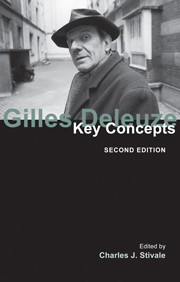1 - Force
from PART I - PHILOSOPHIES
Summary
Deleuze's employment of the concept of force (the same in English and French) can be grasped in terms of two distinctive but somewhat overlapping phases. In the first, associated with the “historical” emphasis on the works on Spinoza and Nietzsche (among others) that marked the earlier part of Deleuze's career, force is understood primarily in terms of its relation to notions of speed and movement. In the case of Spinoza, Deleuze is particularly impressed by Spinoza's philosophical ambition to view all of life as the expression of a fundamental striving or conatus, so that the body becomes an ensemble consisting of those forces that it transmits and those forces that it receives. Spinoza, says Deleuze in Spinoza: Practical Philosophy, “solicits forces in thought that elude obedience as well as blame, and fashions the image of a life beyond good and evil, a rigorous innocence without merit or culpability” (SPP: 4). This fundamental insight is carried through in Deleuze's work on Nietzsche, where Nietzsche is depicted as someone who follows faithfully Spinoza's injunction that we think “in terms of speeds and slownesses, of frozen catatonias and accelerated movements, unformed elements, nonsubjectified affects” (SPP: 129).
In the second phase, associated primarily with Deleuze's collaboration with Guattari, the notion of force is effectively generalized, so that it expresses a power that ranges over the entirety of the social order.
- Type
- Chapter
- Information
- Gilles DeleuzeKey Concepts, pp. 21 - 32Publisher: Acumen PublishingPrint publication year: 2011

